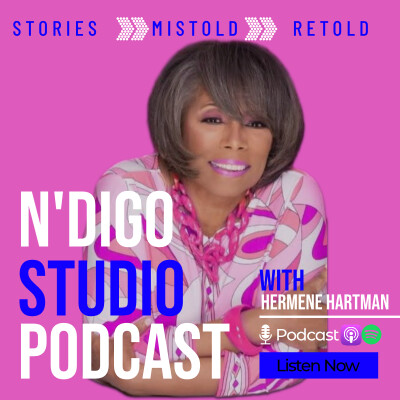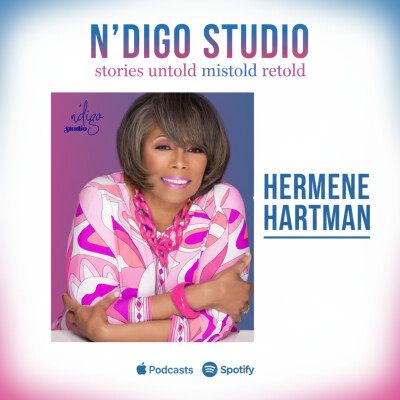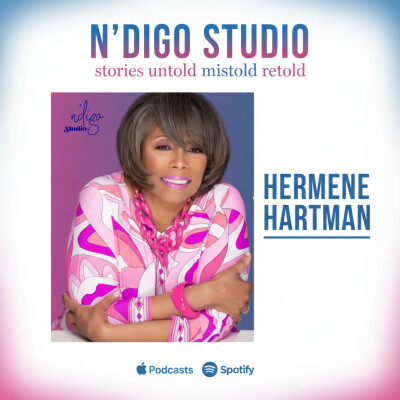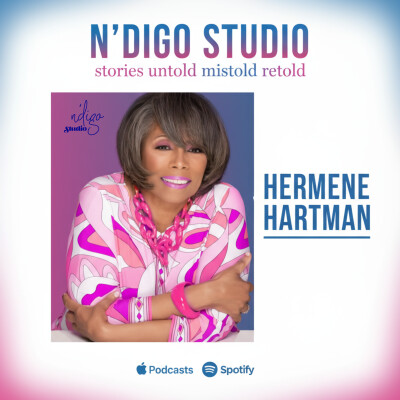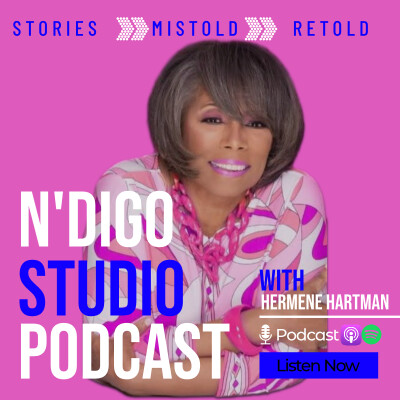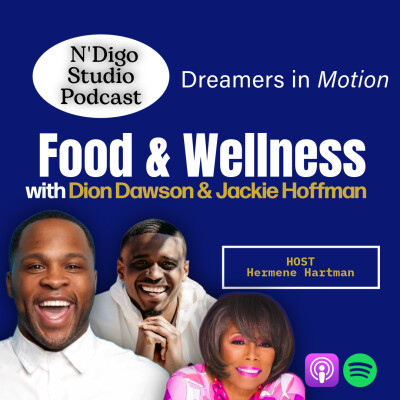- Speaker #0
Hi, I'm Hermine Hartman with Indigo Studio. Today I want to welcome to our living room and we're going to talk about black public media. You know, that's a critical issue. It's a critical issue to media and to culture because the reduction of funding for Black funding media has been defunded by the Trump administration. And that means that the essential elements for support and access and opportunities for Black filmmakers and documentarians has vanished. Well, that's not it. For the last 50 years in Harlem, Black public media has been producing and distributing original content for public television about the highlights of the global Black experience.
- Speaker #1
You can see that this music at the weapon.
- Speaker #2
Sometimes we do use the music as a weapon against man's inhumanity toward man.
- Speaker #3
Everything I wrote and recorded had to do with the movement.
- Speaker #4
It was a new political feeling among the guys.
- Speaker #0
Their greatness has earned Emmy Awards, Peabody Awards, Tally Awards, and even an Oscar nomination. Their support brings about authentic voices and experiences on the screen, shaping documentaries that prepare. history, reflect our communities, and share genuine stories.
- Speaker #5
The story of the Negro in America is the story of America. It is not a pretty story.
- Speaker #6
Most of the white Americans I've ever encountered, sure they have nothing whatever against Negroes. That's really not the question. Really a kind of apathy and ignorance. You don't know what's happening on the other side of the world because you don't want to know.
- Speaker #0
Now that that funding is at risk, the future of these stories and the cultural narratives is in question. Today, we're going to talk to Leslie Phil Cruz, who is the executive director of Black Public Media, and we're going to show you some of their work. I'm talking to Leslie Phil Cruz of Black Public Media. Leslie, talk to me about... Black Public Media and what its goal and purpose and inception was in the first place.
- Speaker #7
Sure. Black Public Media is a 40-plus-year-old nonprofit that focuses on supporting the independent documentary makers who are telling stories about the Black experience and ensuring that those stories that we're supporting are available to the public for free via public media. So we work closely with PBS and many of the... programs that broadcast on PBS called such as Independent Lens and POV. And we also have our own series called Afropop, the Ultimate Cultural Exchange, which is in its 17th season.
- Speaker #0
Am I correct that you're the only organization of your kind philanthropically in the country?
- Speaker #7
Yeah, I would say that. I mean, I don't know if there's any. a nonprofit that is funding solely documentary stories about the Black experience. So yes, I would say that we are the only organization out there doing that type of work.
- Speaker #0
Okay, so something happened this year that the feds defunded you. Tell me about that.
- Speaker #7
So the rescission bill that went through this summer required that money that had been allocated to the Corporation for Public Broadcasting, which is our one of our main funders, right, money that was awarded or allocated two years, two years prior to right now, the rescission bill clawed that money back for 2026. So when Congress voted to say, yes, we want to spend, you know, one point, I think it's one point. $1 billion, $1.8 billion, well, $1 billion on public television. And that money will be available in October 1 for fiscal year 26, which actually starts October 1 of 2025. You know, Congress made that decision two years ago. And the current administration is, you know, they're pulling money back all over the place. They're breaking things down, busting things up. And this was one of the things that they did. They rescinded the funding. the advanced funding to the Corporation for Public Broadcasting, which meant that come October 1st, when we were expecting $1.8 million to be provided to Black public media, that money's not there.
- Speaker #0
All right. So what do we do? We're not going to go out of business. We're not going to go under. What are we going to do in terms of funding, Leslie?
- Speaker #7
Well, right now, many thanks to a number of our other funders who have stepped up to the plate, who are supporting us. You know, that's one of the reasons why we are not going out of business. But we have had to let go a few of our beloved staffers, which was really frustrating because that's not something, you know, they didn't do anything. It's just because the funding wasn't there. But we are also we've launched what we're calling our one point eight million donor campaign. We lost one point eight million dollars, but we're actually looking for one point eight million donors. This is people in the public from the public. Because remember, the funding that we received from the Corporation for Public Broadcasting, that was funding coming from the people. It was coming from the public. So we're taking our story, we're taking our need directly to the public. And we're saying, if you enjoyed films like I Am Not Your Negro, if you enjoyed films, documentary films like The Disappearance of Miss Scott, then you should support Black public media. because we were... one of the funders in both of those films. And we came in at very crucial times in the project's development. Also, Max,
- Speaker #0
you did something with Max Roach.
- Speaker #7
Yes, Max Roach, The Drum Also Waltzes. That is another one of the films that Black Public Media has funded. And so part of our campaign over the next year is we're trying, like I said, to reach 1.8 million donors. You can give anywhere from as small as $5 to as much as you would like to support. support independent documentary films about the Black experience.
- Speaker #0
So if someone does, who's watching with us today, who wants to donate, tell me how they might do that.
- Speaker #7
They can go to our website, blackpublicmedia.org. And right there, when you land on that front page, you'll see a button to donate. Just click that and you make your donation.
- Speaker #0
Okay. So that's easy. That's easy enough, right? So do you think with the decrease The defunding, not the decrease, the decrease and the defunding. Do you see erasure? Do you see the Black narrative not being erased from the public, our storytelling being erased?
- Speaker #7
You know, I think it's an attempt at erasure, right? I mean, if we look at our history and we know our history, these attempts have happened since we got here. Right. They they they took our language because they didn't want us to speak to each other. They didn't want us to. But we found our own language and we started to share stories and we continue to share stories. So, yes, I believe it is an attempt at an erasure of of black stories, black history. You see what they're trying to do to the African-American Museum. You know, so but but again, I use the word attempt because in my I have to believe and in my heart of hearts. and if I know my ancestors. they will never erase our stories. They're going to try, but they will never succeed. And it is because we will continue to be innovative and we will find ways to make sure that our stories are made and seen. So yes, they're attempting to erase our stories. They will not succeed.
- Speaker #0
No, they definitely will not. We're too far. We're too much educated now. With digital media, it's a lot easier. What does it mean, though, for, as we talk about the Black experience, as we talk about our own documentaries, as we talk about the Max Roach story, as we talk about I Am Not Your Negro, as we talk about these stories, it is the perspective that is so valuable and so important to be told. It's not another story about James Baldwin. It is a Black story. on James Baldwin. That's important. Talk about that perspective for me and the value of that.
- Speaker #7
Yeah, I, you know, one of the reasons Black public media exists really is to make sure that the Black perspective on all things in this country and in this world is represented, right? You know, many people can do a story on James Baldwin, James Baldwin, but I don't think that It took Raoul Peck to do one of the defining stories about James Baldwin. And it was based off of James Baldwin's own words.
- Speaker #0
That's right. In his own words.
- Speaker #7
In his own words. And so there is definitely a need to make sure that our stories and the diversity of our stories. Let me just say that because oftentimes people tend to want to pigeonhole the Black experience. But we know all too well that the Black experience is very diverse. It has many different perspectives. And that's one of the things that we at Black Public Media, that's what we understand. So, you know, someone else might bring a story to us about James Baldwin, but it might focus on a different part of his life. It might focus on, you know, one of his books. And so, and we will see that and we will appreciate that because we know that there's just no one way to tell James Baldwin's story, right? There's no one way to tell the story about Blacks in Chicago, right? We want to make sure that we're funding, that we're there to support the diversity of those stories, because there is no one way to be Black.
- Speaker #0
So without you, these stories might not happen. They might not be told. These stories are expensive to tell. Documentaries are very expensive and long-range activities, because there's research to be done, there's film to be pulled, there are books to be read. And it's not, you can't do it in an hour. It's not a soundbite. It's not a soundbite. It's way from a soundbite, but these are real stories. And I thank you for doing what you do. And I hope people see this show and see the value of contributing to Black public media. And we're going to talk in a bit to some Chicagoans, Chicago women that you funded. And we're going to talk about. their experience and their program, and we're going to show a bit of it. Thank you so much, Leslie, and we have to keep telling our story.
- Speaker #8
Whether you're considering an electric vehicle at work or at home, making the switch may not be as complex or expensive as you think. The tools, resources, and rebates available at ComEd.com slash EV make transitioning to an electric vehicle easier and more cost-effective than ever before. Charge into the future at ComEd.com slash EV. At ComEd, we understand a little help can really make someone's day. That's why we provide financial assistance and billing options to help you pay and manage your electric bill. Use the ComEd Smart Assistance Manager to discover bill assistance and savings options designed with you in mind.
- Speaker #0
Welcome back to Indigo Studio. Joining me now are two ladies who did their first documentary and they were funded by black media. They've done some wonderful work. You're going to meet Arlita Hall. She's a host. She's an actress. And most of all, she's a stand-up comedian.
- Speaker #9
My dad still thinks that he's a principal. So when I get in there, he's like, what's on the agenda today? And I'm like, well, at 10.30, we'll have a board meeting.
- Speaker #10
So we'll continue working on that. OK.
- Speaker #9
Then I gave my daddy in the shower. He all good until he peeped that man in the mirror. So he'll be watching. He'll be like, get out of here! What are you doing? Get out! So I come in there, I be shooting that man. Bop, bop, bop, get out of my damn shower.
- Speaker #0
And she is also a certified dementia communication specialist. First-time filmmaker, and the film is Finding Your Laughter.
- Speaker #9
I am the daughter and caregiver of Milton Hall Sr. Who is a person with Alzheimer's? Here you go. Here you go,
- Speaker #11
have one. What's it do? That's the oven, that's not the refrigerator. Right. What's your birthday? August 6th.
- Speaker #9
1948. Today is August 6th, 2018. It has been a blessing and a challenge. Being around you brings me so much joy.
- Speaker #0
And Brittany Alsott, she learned the power of participating. In a documentary for early careers making short videos about young cancer patients in Seattle Children's Hospital. You all got together and you did something very very interesting and I think very very important. So Alita tell me how your film Finding Your Laughter came about and why you did it.
- Speaker #9
My father was diagnosed with Alzheimer's disease and I decided to quit my job at the time I was a human service caseworker for the state of Illinois in the Woodlawn community. I loved my job and I loved taking care of people but I learned at my job with the clients that I had about home care aides and so I was like hmm maybe I can do this for my father and take care of him because my grandmother had Alzheimer's so I already knew what it looked like. That he was going to forget who I was. I watched her forget who I was. So I was like, I want to kind of help my dad the entire way through to help him have the most fun, because that's who my dad always was. So I decided to quit my job. And then I would post videos on social media, like we all do. But I would post videos of me stepping with him, that Chicago step. And then people would be like, I love to see what you're doing with your dad. I look on social media to see how you and your dad are communicating. I'm like, what? Alzheimer's looks cool? You gotta be kidding me. So it really touched me because it made me feel like other people can hear, see the story without Alzheimer's always looking. So like most commercials or images you see it's always like lights down, someone in the corner, really really dark. So I was like I want to do something that's really fun. We were dancing, we were laughing, no matter what character he thought I was I would always go along with it.
- Speaker #0
Your father was a principal.
- Speaker #9
Yes.
- Speaker #0
What school was he principal at?
- Speaker #9
So he opened up Claire's academic school. It is an alternative school. And then he retired as a juvenile justice reentry coordinator for the state of Illinois.
- Speaker #0
Now Brittany, how did you all get involved? I want to hear how this film came about. How did you get involved and how did the film start?
- Speaker #12
Yeah, Arleta and I met on a film set. I was the director of photography and Arleta was a PA. And we just hit it off and then we became friends and Arleta asked me to film some of her comedy shows. She had a birthday show where she hosted and danced and did comedy and did improv. So it was a lot. And she told me about her father and when I came over to meet him and to start filming with them because she wanted to capture him while he was still pretty lucid. I was really struck by their unique relationship. I lost my dad when I was little and so it made me think about these moments that I didn't get to have, these conversations I didn't get to have, and I really wanted to support Arlita in telling this story.
- Speaker #0
So the film goes through the journey of dementia Yes. And you were showing... everyday living. Did you take care of your dad by yourself? Were you the chief caretaker?
- Speaker #9
So no, I was a part of a care pair along with my stepmom, who I call my bonus mom, Charmaine. So her and my father were living together and they just took care of her mother with Alzheimer's until the end. And then right after she died, maybe two years later, my father was showing signs. So I quit my job to help her, even though she was like, I don't need help. I'm like, yes, you do. So I started helping her and getting along with their journey, and I kind of go along with them. Even though I quit my job, I felt like I was retired with two boomers. So I got to understand the life of The View, working out and having some coffee.
- Speaker #8
Whether you're considering an electric vehicle at work or at home, the tools, resources, and rebates available at ComEd.com slash EV. make transitioning to an electric vehicle easier than ever before. At ComEd, we understand a little help can really make someone's day. That's why we provide financial assistance and billing options to help you pay and manage your electric bill.
- Speaker #0
So... Why was it, was it intrusive, invasive for you to have the film in such intimacy, everyday living? Or was it staged for filmmaking? How did that work out for you?
- Speaker #9
So originally, I would just do videos of me and my dad. Then when it came time, we were actually doing a documentary. So Brittany's first time over, I told my dad. We were making a TV show about him and all the great things that he's done. Because he's been like a writer, performer, just a lot of good things. And he was like, OK, as long as it's nothing ridiculous. So we like, OK. He let us mic him. And then he sat down and literally went straight into character. And the first thing I believe he said on camera was, thank you all for remembering what's going on. So, you know, I mean, straight into mode as if he was running the show. And with that being said, he was okay with it every time we brought the camera on and he would talk to it with me. So I felt like it was more so not only him recognizing that he was being filmed, but also he was just okay with having time with me. Like this my daughter. That was your time together. Yeah, this my daughter. She happy, she playing. And he didn't, at a certain point, I could tell he didn't know how old I was. So he was just happy I was just there.
- Speaker #0
You were still his little girl.
- Speaker #9
Yeah, and I would be like, Daddy, and he'd be like, go sit down somewhere. I'm like, okay, he think I'm five. Milton, we need you in the kitchen. You know, he'd be like, oh, okay. Who was that young lady?
- Speaker #0
What did you both learn from the film? To live with someone with dementia is quite and experience. There are a lot of learns with the experience. They're tender, they're funny, but they'll also cry a lot. What did you learn from the film that you want others to know, and what did you learn in shooting the film? What'd you learn? What's the learn?
- Speaker #9
So for me, I was studying improv at the same time that I was my father's caregiver.
- Speaker #0
That's how you kept saying.
- Speaker #9
Yeah. So what I learned with improv comedy is the rule of yes and to be in agreement with your scene partner. So if they tell you like, today we're going to the store. Yes, we are going to the store and we're going to buy some greens. So I learned how to go along with my father, no matter what he was saying. And so which validated him in a lot of conversations, no matter if he got confused or what, I'm going along with it. And I'm prolonging the conversation. And even when he would get sad or angry, I would validate him and make him right. You have every right to be mad. You absolutely right. It's my fault. I done messed up again.
- Speaker #0
So agreed.
- Speaker #9
I agreed. And even though it would hurt me, and I'm going to be, you know, because at the end of the day, I'm watching the person that I looked up to to know, everything die every day. So it gave me the moment to just have some laughter and agreement and watch him feel like, He was running the show instead of feeling like he doesn't know anything at all because it wasn't worth me being right. So I feel like that's what I learned the most. When you're a caregiver, you don't have to be right with the person you're taking care of because they already are dealing with a dis-ease. So if you can meet them where they're at and agree with them in those simple conversations, you give them so much more in that time instead of argument.
- Speaker #0
Brittany, what'd you learn?
- Speaker #12
I learned so much about improv, for one, and just... looking for joy in the moment, in life, and in your family, to really find that closeness and like, yeah, just watching Arlita, like what would she give up to take care of her family and have that time with them and how to make that into something that is gonna benefit other people as well, to be really... to be really honest and really vulnerable. I think that's powerful.
- Speaker #0
Profound. Finding that joy. Because you got to find the joy, not the darkness of it, not the ugliness of it, but you got to find the joy of it. How did you come up with the name Finding Your Laughter? Because when I heard about it, I was like, what does that mean, Finding Your Laughter? How did you come up with that title?
- Speaker #9
So we were working through a few different titles on the film, but The title came from a conversation that I had with one of my friends. And we were just talking about life in general. And then I was talking about how now that I'm a comedian, you know, and I've been silly my whole life, people always want me to just do stuff on the fly. And I'm like, find your own laughter. And I'm like,
- Speaker #11
hmm.
- Speaker #9
Then me and Brittany started talking again. I'm like, maybe we could be finding our laughter because really what I'm doing with my daddy is not funny. I'm finding my laughter along this journey. And as I'm finding it, he's laughing along with me. And then we put it at... With the film, we were like, we think this works. And it felt like something that, because we were working on it, it was finding as well. So once we talked about it and kind of talked to a few different people, everybody liked it.
- Speaker #0
It's a fabulous title. How did you get your funding from... Black media, how'd you get your funding? How did that come about?
- Speaker #9
So we met Black Public Media in 2022 at the Gotham Week Lab in New York. We met Carol Bash. We sat down with her and talked about our project. We were nowhere near as far as we are right now. And the first thing we got from Carol was a listening ear, validation that what we're doing is important. She was like, it's okay to do all the first-time filmmakers. You all are working together. She was like, and you're a Black filmmaker. Now she's like it's not going to be easy, but your story is important. Needs to be told and let's stay in contact. So I believe we applied that year, but we didn't get in. Because like I said, we weren't where we needed to be, but they kept contact with us and then reached out to us like every six months or two year like I just want to check in on a project and we have applied to a lot of grants we have never been reached out to to see how we are doing.
- Speaker #0
Had you start filming yet?
- Speaker #9
Yes, we had already been filming.
- Speaker #0
So you had started filming before you got funded,
- Speaker #9
yes. We had already been in production before we got funded. We just kind of hopped off the ground and started in production. So we were in the middle of production when we met them, and they always checked on us to see how we were doing. And then this last time around, they were like, you all should apply, and invited us, like, hey, we got this open, apply. So we applied, and then we got in. And when we got into the Pitch Black Incubator 360 program, it was like, not only do you get into Pitch for $150,000, We're going to prep you to do that. So they had already checked on us and built a relationship with us, but then they were like, now we're going to mold you into not only filmmakers, but being able to represent the film. So, like, represent you as a business. So that's how we ended up meeting them and going into the Pitch Black program. And we went to the incubator for a weekend. They taught us so much. We did virtual meetings with them. And then we went out there. We took everything that they taught us and applied it. That's key.
- Speaker #0
Did you show them anything? Did you show them any excerpts of what you had been, what you were filming? Yes, we did.
- Speaker #9
We showed them stuff and we practiced pictures and they were honest like, you're going to have to work on this.
- Speaker #0
So, we have more films to look forward to?
- Speaker #9
Yes. So, because of Black Public Media funding us, we can now actually finish our film. So, we are on board to finish our film this year.
- Speaker #0
You have a new film?
- Speaker #9
No, Finding Her Laughter.
- Speaker #0
Oh, so you're not done yet?
- Speaker #9
We're not done yet. We just got the funding this year.
- Speaker #12
With the Black Public Media funding, we are able to fund post-production and finish the film this year, which we're very excited about. We've been working on it for over six years.
- Speaker #0
Six years in the making?
- Speaker #9
Yes.
- Speaker #0
Wow. Ladies, you all have done a magnificent job. Great six years worth of work. And telling a story about taking care of a parent and going through Alzheimer's. That's quite a feat. That's a journey. And if you found joy in it and you found laughter in it, I'm glad you're sharing it. Thank you so much for being with us. And, you know, we've got to keep black funding media alive because these are things that Hollywood is not going to do. But these are stories that are real. They are honest. They are authentic. And they are about things that people should know. Congratulations to you. And I look forward to seeing the full film. I've seen the excerpts and I'm just cracking up at you. And congratulations. Thanks for being with us. This is Hermine Hartman with Indigo Studio.
